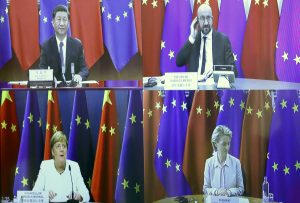The European Union is certainly not a major stakeholder in the South China Sea disputes and does not claim to be. Yet, at the same time, it has significant interests in the issue – and not only because 40 percent of its foreign trade is dependent on this free and safe corridor. The EU has major partners directly involved in the disputes, and perhaps more importantly, it has systemic interests to defend. As suggested in 2016 at the Shangri-La Dialogue by Jean-Yves Le Drian, then France’s defense minister, “if the law of the sea is not observed in the China Seas today, it will be in jeopardy in the Arctic, the Mediterranean or elsewhere tomorrow” – a concern recently echoed by a NATO report.
Where are we today with this assessment? Is there any possibility for the new “geopolitical” EU Commission (as it has branded itself) to budge China without compromising too far on its fundamentals? Or will the South China Sea challenge be an additional humiliating game of hide and seek for Europe? Facing China’s increased self-confidence – even impatience – in shaping its own global order, can the EU contribute to that order’s elaboration while preserving its core values? At the very end, what is at stake is the EU’s legitimacy as an exemplary model for peace.
The fundamental attachment to the rule of law demonstrated by the European Union over decades is not the product of concepts elaborated by lawmakers in their ivory towers; it has been generated incrementally after a long history of painful and costly wars, violence, and devastation. It should not be mistaken for a half-hearted inspirational ideal but instead be understood as a concrete vision that has matured over centuries: pooling resources and sharing a market system in order to make war “not merely unthinkable, but materially impossible.”
This cooperative endeavor, aimed at producing peace and prosperity through economic unification and shared core values, was born in 1958, and is based on the respect of international law recognized as a body of rules binding mutual relations between states. Indeed, the EU considers democracy (a space of discussion among equals) as the foundation of the international system and the best guarantee for peace. Rule of law is a foundational principle shared by member states and a pillar of the EU’s identity. It has become a framing vector not only for the European Union’s integration through the acquis communautaire (the EU’s body of law) but for its external action (the universal applicability of these political values is enshrined as constitutive principle in its treaty). Despite all its pitfalls and deficiencies, much has been achieved without endangering this teleological formula.
From this observation derives the EU’s compliance with the rule of law and its cooperative, normative, and benevolent approach. For sure Brussels is war-averse: As a prerequisite, its model postulates that war is not the appropriate solution for settling disputes. In assuming such a position as one of its greatest assets and a source for legitimacy, the EU opted to diffuse its norms as an expression of its peaceful influence. Was that wishful thinking?
































